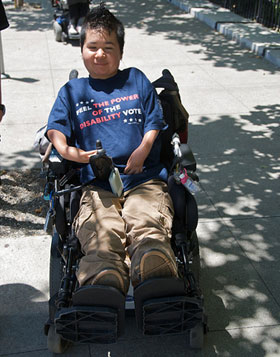
Modern corporate capitalism has given rise to much of what Karl Marx and Frederick Engels highlighted over 150 years ago. For example, the commodification of everything (turning everything into something for sale – for private profit). In fact, the Communist Manifesto rings prophetically truer today than when it was first written.
However, the phenomenon which it does not address and maybe could not have even predicted is the rise of a disability subculture which has a worldwide presence – though this presence can best be felt in developed countries – with the infrastructure to support people with disabilities.
Though Marx and Engels may not have predicted the rise of an engaged population of people with disabilities, they did predict the push toward “improvement,” which has led to longer, more active lives for people with disabilities. This improvement allows for longer lives and more adaptive equipment, which leads to a more fully engaged disability rights community, but it has also led to a tacit – sometimes unwanted – partnership between people with disabilities and the for-profit health-care-helping system.
This partnership goes largely unnoticed by people with disabilities because the health-care-helping system sells them on an idea: that in order for them to be independent they must use the health-care-helping system as a gatekeeping entity; that they can’t be independent without it.
Unfortunately, as a disabled person I know first-hand that we should proceed with caution on this. It is easy to say, “This relationship has been beneficial to both parties,” and this might suggest that the capitalist system is responsible for improving the lives of people with disabilities. The truth, however, is entirely different. The gatekeeping relationship simply plants an inborn, systemic oppression into disability culture. And this relationship actually only benefits one party, the capitalists, while creating more and more profits off of the backs of the disabled.
The main point here is: Improvements in the lives of people with disabilities were made because people within the health-care-helping system could profit from their disabilities, not out of the kindness of capitalists’ hearts. Furthermore, those improvements were often instigated by individuals who want to support the corporate capitalist structure as it is.
It is all too easy for us to look at the community of people with disabilities and only see issues. While we should understand that there are a myriad of concerns holding a large part of this community hostage, keeping us from reaching full self-actualization, and while these social, political and economic injustices need addressing, we first need to lay a foundation by which we can begin a conversation about a subculture which is largely untapped in its progressive, democratic potential.
As a community, we come from all walks of life. We’re black, brown and white. We also identify as heterosexual, bisexual, transgender and queer. And our numbers are so numerous that if fully engaged we could bring about social, political and economic changes capable of affecting the entire capitalist system.
Let us begin a journey with this notion: Like other working class folks, we are a group of people oppressed by a system that teaches us to oppress ourselves. We are ready to rise up and take our place fighting for a new vision of society, a society that values all of us – for our imperfections and perfections alike.
Chris Worth is a grassroots community organizer for Paraquad, a disability rights organization formed to empower people with disabilities. Chris, who was born with cerebral palsy, grew up in West Virginia and now lives and works in St. Louis.
Photo: Steve Rhodes CC 2.0

MOST POPULAR TODAY

High Court essentially bans demonstrations, freedom of assembly in Deep South

Zionist organizations leading campaign to stop ceasefire resolutions in D.C. area

U.S. imperialism’s ‘ironclad’ support for Israel increases fascist danger at home

UN warns that Israel is still blocking humanitarian aid to Gaza







Comments